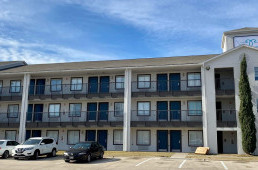
January 15, 2021 | by Anna Orendain
Categories: Affordable Housing, Homelessness, Supportive Housing Services
When the COVID-19 pandemic first began in the U.S., many Americans sheltered in place and, where possible, began working from home to reduce the transmission of the virus.
Yet, as the rest of society hunkered down at home, many housing advocates jumped into action, creatively weighing housing options so that those without homes have shelter too.
One of these solutions, featured on Shelterforce.org and rising in popularity across the country, involves housing our neighbors experiencing homelessness in hotels that, with the slowdown in the tourism market, would otherwise be empty or out of business.
Unlike what is common in temporary congregate shelters, the hotel approach allows enough separation to where families and individuals have their own rooms, providing them with a safe place to self-isolate and prevent any negative health outcomes for themselves and neighbors.
Apart from the immediate health benefits that these hotel shelters provide during this pandemic, many homeless services organizations are noticing a significant reduction in “emotional and behavioral health issues that they normally encounter” when relying on temporary congregate housing.
Shifting to the more individualized hotel approach has allowed the temporary residents to relax, focus on their health, and figure out what services they need in order to find permanent housing.
Directions Home, a two-person unit in the Fort Worth City Manager’s office, is creating similar housing in Fort Worth. As participants of TSAHC’s 2020 Texas Supportive Housing Institute, Directions Home leveraged connections and resources to provide permanent supportive housing to the chronically homeless, especially those that are above the age of 65 or highly susceptible to COVID-19.
Called Casa de Esperanza, the development involved the rehabilitation and conversion of a former hotel into a 119-unit service-enriched community, rapidly creating housing for Fort Worth’s most vulnerable residents. The bulk of the project’s financing came from $9.3 million in CARES Act (coronavirus relief) funding.
This housing will improve the health and stability of community members that aren’t otherwise covered through funding sources, and it will give them the support they need to make a permanent transition to long-term housing and employment.
To learn more about the Texas Supportive Housing Institute and its 2020 participants, click here.
The Shelterforce piece mentioned above was one of the Top 10 Shelterforce articles of 2020. Click here to read about their other top housing stories of last year.
On the House blog posts are meant to provide general information on various housing-related issues, research and programs. We are not liable for any errors or inaccuracies in the information provided by blog sources. Furthermore, this blog is not legal advice and should not be used as a substitute for legal advice from a licensed professional attorney.
TSAHC reviews all blog comments before they are posted to ensure a positive experience for our online community. Off-topic comments; hostile, derogatory or deliberately insulting comments; and comments specifically promoting goods and services will not be posted.
Approved comments will be published in their entirety. Personal information will not be removed unless it pertains to someone other than the person submitting the comment. For more information, please see our Comment Posting Guidelines.
To remove a previously submitted and published comment, please contact Anna Orendain at [email protected].
If you have a question regarding any of TSAHC's programs, please contact us.
